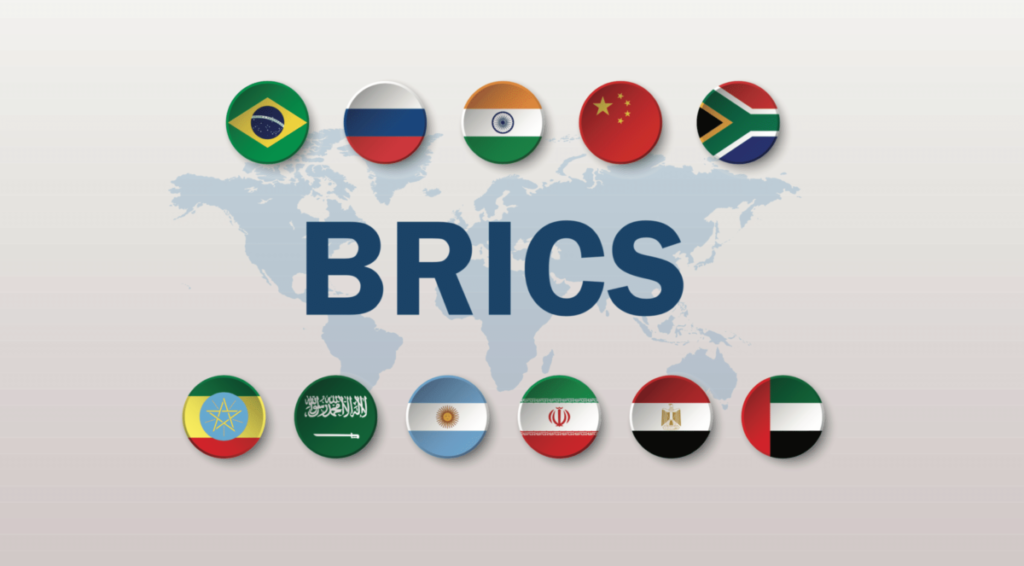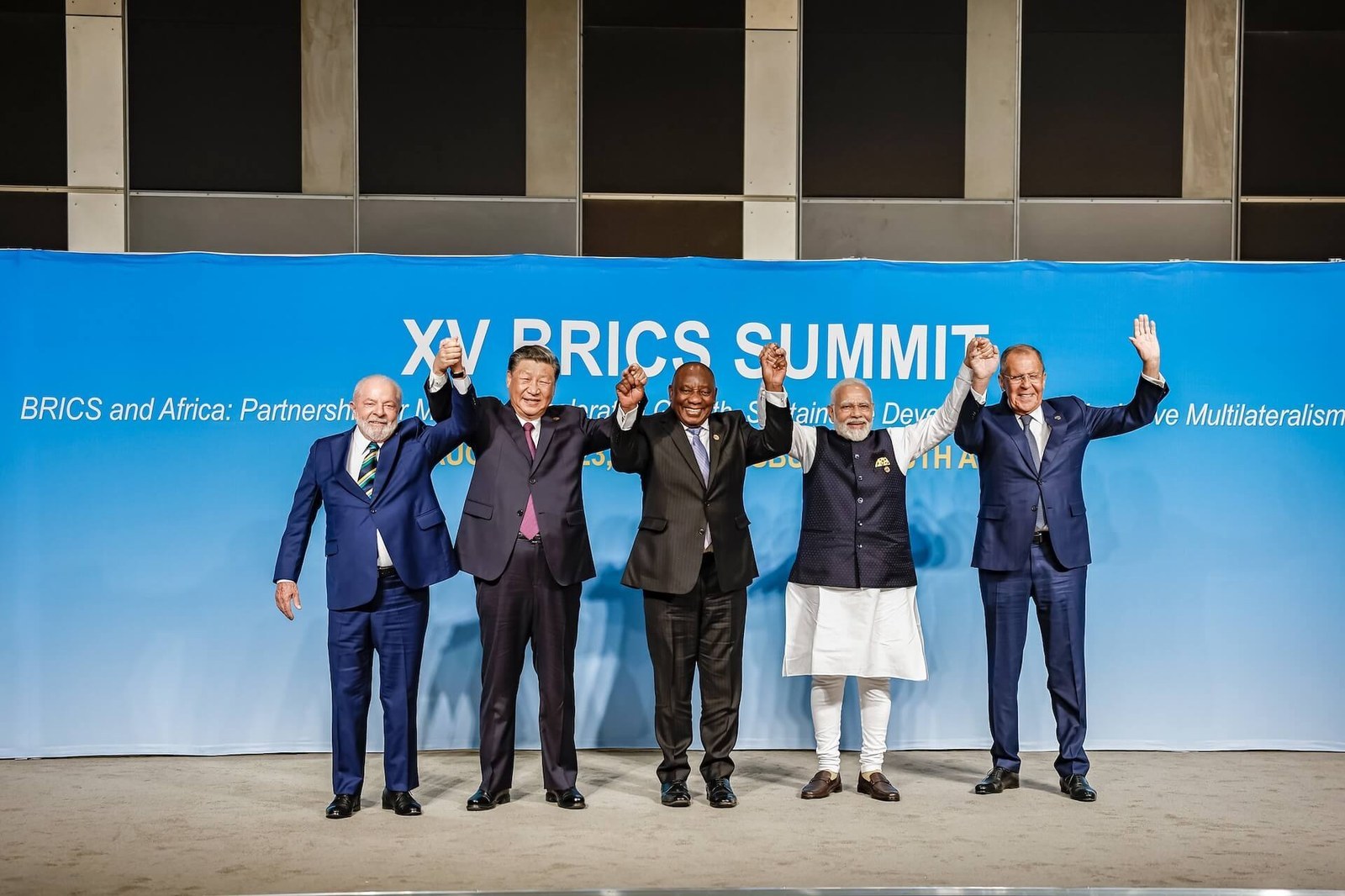At its 17th summit in Rio, the expanded BRICS bloc faces a moment of reckoning as it seeks to balance growing ambitions with internal divisions, shown in its rare unified stance on U.S.-Israel strikes and push for Global South representation. While advancing financial tools and a climate agenda, BRICS’ core challenge is defining itself not as anti-West, but as a united advocate for a more equitable global order.

Official Brics signage lines the avenue outside Rio’s Museum of Modern Art, the designated venue for the leaders’ summit scheduled for July 6-7, 2025. (Photo: SCMP)
As the BRICS countries gather in Rio de Janeiro on July 6, 2025, for its 17th Summit, the combine of Brazil, Russia, India, China and South Africa – now accompanied by five new members – faces a moment of reckoning.
The group of major emerging economies has largely focused on global economic issues since its first summit in Yekaterinburg in 2009, when Brazil, Russia, India and China came together for the first time. South Africa joined the group the following year, while last year BRICS added five new members – Egypt, Ethiopia, the United Arab Emirates, Iran and Indonesia.
With this major expansion, this group of ten nations now represents a broad swathe of the developing world and regions spanning Latin America, Africa, the Middle East, and Asia. In its diversity and spread, it can truly claim to speak for the Global South.
Yet for the BRICS, finding a common voice has not been without its challenges. This has especially been the case when it comes to geopolitical and strategic issues, on which these emerging economies, broadly united in their quest to create a more equitable global economic order, have often staked out differing positions.
Indeed, this was why the 10 countries coming together, in a rare moment of unity, to express their opposition to the military strikes on Iran by Israel and the United States, was noteworthy.

Describing the strikes as “a violation of international law and the Charter of the United Nations,” the June 25 statement spoke for developing countries in warning of the “unpredictable consequences for international peace and security, as well as for the world economy.”
“Guided by the principles enshrined in the United Nations Charter, BRICS remains committed to promoting international peace and security and to fostering diplomacy and peaceful dialogue as the only sustainable path toward long-term stability in the region,” the statement said.
The common BRICS stand spoke up in support of the importance of international law and against unilateral, illegal military actions. The 10 countries “expressed serious concern over any attacks against peaceful nuclear installations that are carried out in violation of international law and relevant resolutions of the International Atomic Energy Agency” and pledged to “remain seized of the matter.”
This modest intervention might have made little impact on the ground, but it was, still, an important, even if small, step for BRICS in speaking out with one voice. While the expansion of BRICS has certainly widened the grouping’s strategic footprint, it has, on the other hand, arguably made the quest for unity even more difficult.
Indeed, this was the concern voiced by some members when BRICS actively started to pursue expansion. China reportedly led the effort of growing the group along with Russia – both sharing the ambition of creating a wider, non-Western global front.
India and Brazil had, by some accounts, expressed reservations that pursuing expansion would bring with it new difficulties and risk diluting the unity of the group’s five members – a unity that has, at the best of times, proved to be challenging.
The roster of BRICS has now grown manifold, with the 10 current members joined by Belarus, Bolivia, Kazakhstan, Cuba, Malaysia, Nigeria, Thailand, Uganda, and Uzbekistan as partner countries. At July’s Brazil summit, Vietnam will be officially inducted as the tenth partner as part of a stated effort to create a “more inclusive and representative international order.”
This road to expansion hasn’t been without bumps. Argentina was given the green light to join the grouping, but the country changed its mind after the 2023 elections that brought Javier Milei to power. Another country that reversed course was Saudi Arabia, which had indicated its willingness to join only to subsequently declare it was still making up its mind.

President Luiz Inácio Lula da Silva and the Presidents of the People’s Republic of China, Xi Jinping, and South Africa, Cyril Ramaphosa; the Prime Minister of India, Narendra Modi; and the Minister of Foreign Affairs of Russia, Sergey Lavrov, at the 2023 BRICS Leaders’ Summit in Johannesburg. (Photo: Ricardo)
The Rio agenda
The future of the grouping is only one of many difficult issues on the agenda for the Rio summit. Brazil, as host, has emphasised five key priority issues for the summit, including trade and investment, climate change, global health cooperation, Artificial Intelligence (AI) governance, and the future development of BRICS institutions.
On trade, the group has faced pressure from the U.S., with President Donald Trump warning of the imposition of high tariffs if the BRICS continued to move forward with steps to reduce their dependence on trade using the U.S. dollar. Trump has accused BRICS countries of “trying to destroy our dollar” and “create a new currency.”
While there is little prospect of “a new BRICS currency” – it is worth noting there are serious trade issues even among BRICS members – what the countries have been exploring is expanding trading transactions using local currencies. The dollar, even for BRICS nations, isn’t going anywhere, as Indian External Affairs Minister Subrahmanyam Jaishankar made clear before the upcoming summit. New Delhi had “absolutely no interest” in undermining the dollar, he said, even describing the dollar as “a source of international economic stability.”
“De-dollarization” is not the focus of the BRICS economic agenda – creating a more equitable global economic architecture is. A significant BRICS achievement, which has somewhat remained under the radar, is the creation of the New Development Bank (NDB), which has, since its founding in 2015, approved from its gleaming Shanghai headquarters more than120 investment projects, worth more than USD 40 billion. As important as the amount of funding has been the selection of projects, focusing on bringing clean energy, transport infrastructure, environmental protection, water supply and sanitation, and digital infrastructure for developing countries. The NDB is also growing. Ahead of Rio, Algeria was inducted as the bank’s ninth member, joining the five founders, Egypt (inducted in 2023), Bangladesh and the United Arab Emirates (both inducted in 2011).
Also on the agenda, according to reports, is the creation of a multilateral investment guarantee mechanism “modelled on the World Bank’s Multilateral Investment Guarantee Agency” which supports developing countries in attracting foreign investment. This would be an important addition to the BRICS arsenal of financial resources, along with the already existing Contingent Reserve Arrangement.
Anti-West versus non-West
Brazil has also emphasised climate change as a priority, ahead of November’s COP30 climate conference, which will also be hosted by Brazil. BRICS were united in their disappointment in the outcomes of COP29, which fell far short of what developing countries sought in financial assistance from the West.
Brazil’s hope is for the BRICS to carve out a common position and advocate forcefully for the Global South on the highly contested question of climate financing. Towards that objective, the BRICS are working on a joint climate finance framework, which could be approved at the Rio summit. This framework will, Brazilian officials said, for the first time “guide a common and collective BRICS action in the area of climate finance – involving reforms of multilateral banks, more concessional finance, and also the mobilisation of private capital and regulatory matters to ensure that flows can reach developing countries.”
Indeed, forging a unified front on climate change would represent an important achievement for BRICS. As the grouping charts its future course at Rio, a renewed sense of clarity about the message it wants to send the world will serve it well – a message that makes clear that amidst growing global discord, the BRICS is by no means guided by a mission that is anti-West, but one that forcefully advocates for the rest.
